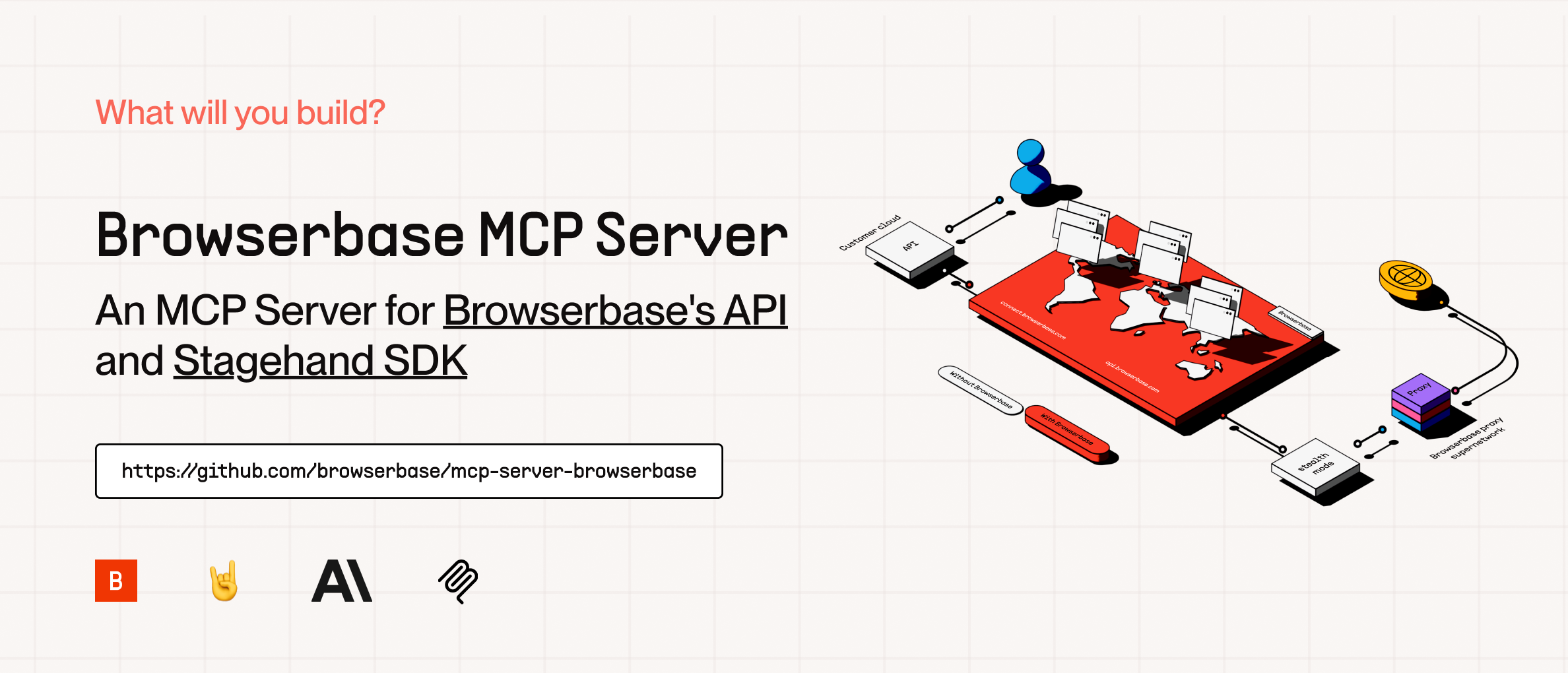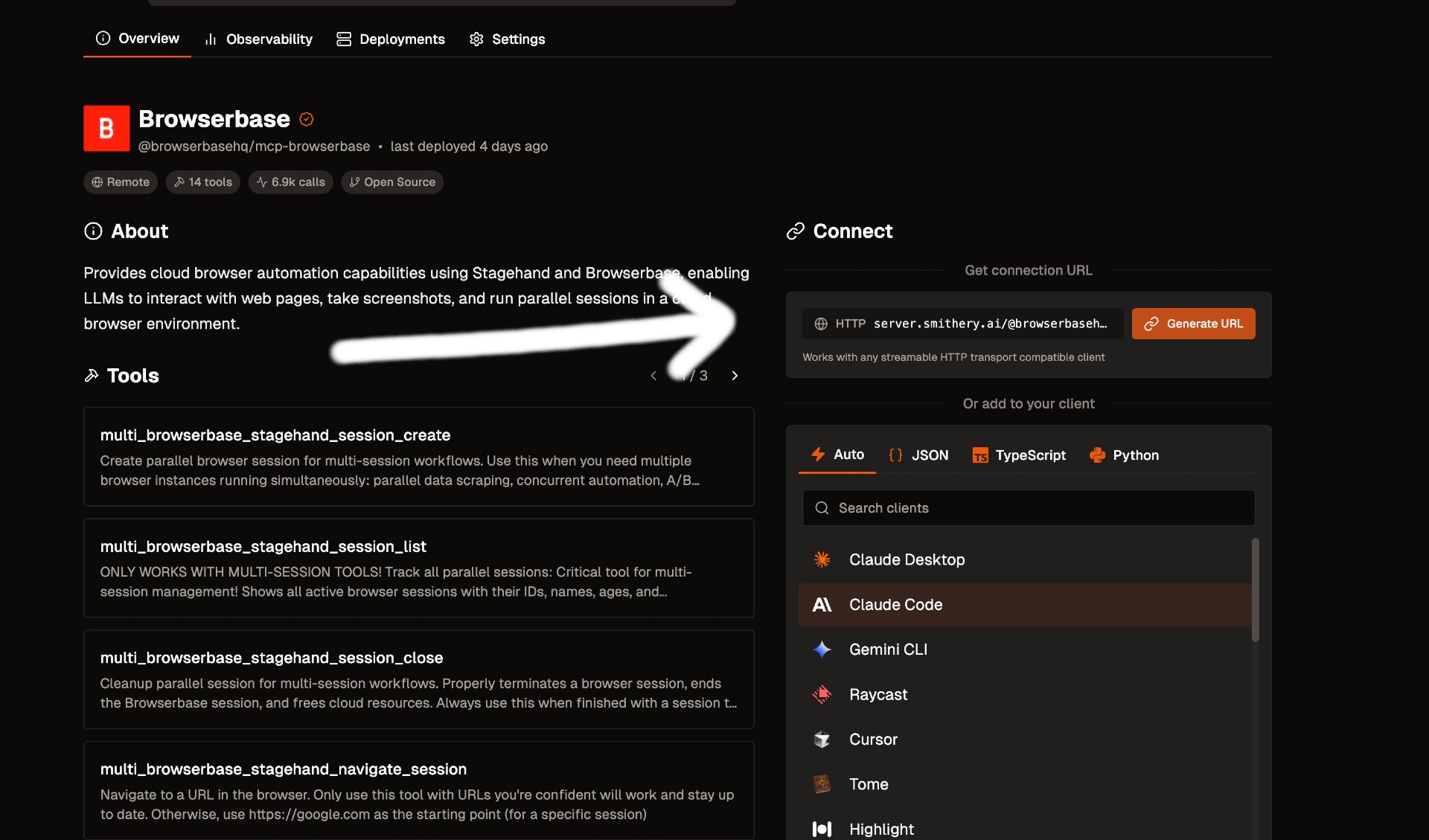
mcp-server-browserbase
Cloud browser automation server for LLMs via the Model Context Protocol.
Key Features
Use Cases
README
Browserbase MCP Server

The Model Context Protocol (MCP) is an open protocol that enables seamless integration between LLM applications and external data sources and tools. Whether you're building an AI-powered IDE, enhancing a chat interface, or creating custom AI workflows, MCP provides a standardized way to connect LLMs with the context they need.
This server provides cloud browser automation capabilities using Browserbase and Stagehand. It enables LLMs to interact with web pages, take screenshots, extract information, and perform automated actions with atomic precision.
Features
| Feature | Description |
|---|---|
| Browser Automation | Control and orchestrate cloud browsers via Browserbase |
| Data Extraction | Extract structured data from any webpage |
| Web Interaction | Navigate, click, and fill forms with ease |
| Screenshots | Capture full-page and element screenshots |
| Model Flexibility | Supports multiple models (OpenAI, Claude, Gemini, and more) |
| Vision Support | Use annotated screenshots for complex DOMs |
| Session Management | Create, manage, and close browser sessions |
| Multi-Session | Run multiple browser sessions in parallel |
How to Setup
Quickstarts:
Add to Cursor
Copy and Paste this link in your Browser:
cursor://anysphere.cursor-deeplink/mcp/install?name=browserbase&config=eyJjb21tYW5kIjoibnB4IEBicm93c2VyYmFzZWhxL21jcCIsImVudiI6eyJCUk9XU0VSQkFTRV9BUElfS0VZIjoiIiwiQlJPV1NFUkJBU0VfUFJPSkVDVF9JRCI6IiIsIkdFTUlOSV9BUElfS0VZIjoiIn19
We currently support 2 transports for our MCP server, STDIO and SHTTP. We recommend you use SHTTP with our remote hosted url to take advantage of the server at full capacity.
SHTTP:
To use the Browserbase MCP Server through our remote hosted URL, add the following to your configuration.
Go to smithery.ai and enter your API keys and configuration to get a remote hosted URL. When using our remote hosted server, we provide the LLM costs for Gemini, the best performing model in Stagehand.

If your client supports SHTTP:
{
"mcpServers": {
"browserbase": {
"url": "your-smithery-url.com"
}
}
}
If your client doesn't support SHTTP:
{
"mcpServers": {
"browserbase": {
"command": "npx",
"args": ["mcp-remote", "your-smithery-url.com"]
}
}
}
STDIO:
You can either use our Server hosted on NPM or run it completely locally by cloning this repo.
❗️ Important: If you want to use a different model you have to add --modelName to the args and provide that respective key as an arg. More info below.
To run on NPM (Recommended)
Go into your MCP Config JSON and add the Browserbase Server:
{
"mcpServers": {
"browserbase": {
"command": "npx",
"args": ["@browserbasehq/mcp-server-browserbase"],
"env": {
"BROWSERBASE_API_KEY": "",
"BROWSERBASE_PROJECT_ID": "",
"GEMINI_API_KEY": ""
}
}
}
}
That's it! Reload your MCP client and Claude will be able to use Browserbase.
To run 100% local:
# Clone the Repo
git clone https://github.com/browserbase/mcp-server-browserbase.git
cd mcp-server-browserbase
# Install the dependencies and build the project
npm install && npm run build
Then in your MCP Config JSON run the server. To run locally we can use STDIO or self-host SHTTP.
STDIO:
To your MCP Config JSON file add the following:
{
"mcpServers": {
"browserbase": {
"command": "node",
"args": ["/path/to/mcp-server-browserbase/cli.js"],
"env": {
"BROWSERBASE_API_KEY": "",
"BROWSERBASE_PROJECT_ID": "",
"GEMINI_API_KEY": ""
}
}
}
}
Then reload your MCP client and you should be good to go!
Configuration
The Browserbase MCP server accepts the following command-line flags:
| Flag | Description |
|---|---|
--proxies |
Enable Browserbase proxies for the session |
--advancedStealth |
Enable Browserbase Advanced Stealth (Only for Scale Plan Users) |
--keepAlive |
Enable Browserbase Keep Alive Session |
--contextId <contextId> |
Specify a Browserbase Context ID to use |
--persist |
Whether to persist the Browserbase context (default: true) |
--port <port> |
Port to listen on for HTTP/SHTTP transport |
--host <host> |
Host to bind server to (default: localhost, use 0.0.0.0 for all interfaces) |
--cookies [json] |
JSON array of cookies to inject into the browser |
--browserWidth <width> |
Browser viewport width (default: 1024) |
--browserHeight <height> |
Browser viewport height (default: 768) |
--modelName <model> |
The model to use for Stagehand (default: google/gemini-2.0-flash) |
--modelApiKey <key> |
API key for the custom model provider (required when using custom models) |
--experimental |
Enable experimental features (default: false) |
These flags can be passed directly to the CLI or configured in your MCP configuration file.
NOTE:
Currently, these flags can only be used with the local server (npx @browserbasehq/mcp-server-browserbase).
Configuration Examples
Proxies
Here are our docs on Proxies.
To use proxies, set the --proxies flag in your MCP Config:
{
"mcpServers": {
"browserbase": {
"command": "npx",
"args": ["@browserbasehq/mcp-server-browserbase", "--proxies"],
"env": {
"BROWSERBASE_API_KEY": "",
"BROWSERBASE_PROJECT_ID": "",
"GEMINI_API_KEY": ""
}
}
}
}
Advanced Stealth
Here are our docs on Advanced Stealth.
To use advanced stealth, set the --advancedStealth flag in your MCP Config:
{
"mcpServers": {
"browserbase": {
"command": "npx",
"args": ["@browserbasehq/mcp-server-browserbase", "--advancedStealth"],
"env": {
"BROWSERBASE_API_KEY": "",
"BROWSERBASE_PROJECT_ID": "",
"GEMINI_API_KEY": ""
}
}
}
}
Contexts
Here are our docs on Contexts
To use contexts, set the --contextId flag in your MCP Config:
{
"mcpServers": {
"browserbase": {
"command": "npx",
"args": [
"@browserbasehq/mcp-server-browserbase",
"--contextId",
"<YOUR_CONTEXT_ID>"
],
"env": {
"BROWSERBASE_API_KEY": "",
"BROWSERBASE_PROJECT_ID": "",
"GEMINI_API_KEY": ""
}
}
}
}
Browser Viewport Sizing
The default viewport sizing for a browser session is 1024 x 768. You can adjust the Browser viewport sizing with browserWidth and browserHeight flags.
Here's how to use it for custom browser sizing. We recommend to stick with 16:9 aspect ratios (ie: 1920 x 1080, 1280 x 720, 1024 x 768)
{
"mcpServers": {
"browserbase": {
"command": "npx",
"args": [
"@browserbasehq/mcp-server-browserbase",
"--browserHeight 1080",
"--browserWidth 1920"
],
"env": {
"BROWSERBASE_API_KEY": "",
"BROWSERBASE_PROJECT_ID": "",
"GEMINI_API_KEY": ""
}
}
}
}
Model Configuration
Stagehand defaults to using Google's Gemini 2.0 Flash model, but you can configure it to use other models like GPT-4o, Claude, or other providers.
Important: When using any custom model (non-default), you must provide your own API key for that model provider using the --modelApiKey flag.
Here's how to configure different models:
{
"mcpServers": {
"browserbase": {
"command": "npx",
"args": [
"@browserbasehq/mcp-server-browserbase",
"--modelName",
"anthropic/claude-3-5-sonnet-latest",
"--modelApiKey",
"your-anthropic-api-key"
],
"env": {
"BROWSERBASE_API_KEY": "",
"BROWSERBASE_PROJECT_ID": ""
}
}
}
}
Note: The model must be supported in Stagehand. Check out the docs here. When using any custom model, you must provide your own API key for that provider.
Resources
The server provides access to screenshot resources:
- Screenshots (
screenshot://<screenshot-name>)- PNG images of captured screenshots
Key Features
- AI-Powered Automation: Natural language commands for web interactions
- Multi-Model Support: Works with OpenAI, Claude, Gemini, and more
- Advanced Session Management: Single and multi-session support for parallel browser automation
- Screenshot Capture: Full-page and element-specific screenshots
- Data Extraction: Intelligent content extraction from web pages
- Proxy Support: Enterprise-grade proxy capabilities
- Stealth Mode: Advanced anti-detection features
- Context Persistence: Maintain authentication and state across sessions
- Parallel Workflows: Run multiple browser sessions simultaneously for complex automation tasks
For more information about the Model Context Protocol, visit:
For the official MCP Docs:
License
Licensed under the Apache 2.0 License.
Copyright 2025 Browserbase, Inc.
Star History
Repository Owner
Organization
Repository Details
Programming Languages
Tags
Topics
Join Our Newsletter
Stay updated with the latest AI tools, news, and offers by subscribing to our weekly newsletter.
Related MCPs
Discover similar Model Context Protocol servers

mcp
Universal remote MCP server connecting AI clients to productivity tools.
WayStation MCP acts as a remote Model Context Protocol (MCP) server, enabling seamless integration between AI clients like Claude or Cursor and a wide range of productivity applications, such as Notion, Monday, Airtable, Jira, and more. It supports multiple secure connection transports and offers both general and user-specific preauthenticated endpoints. The platform emphasizes ease of integration, OAuth2-based authentication, and broad app compatibility. Users can manage their integrations through a user dashboard, simplifying complex workflow automations for AI-powered productivity.
- ⭐ 27
- MCP
- waystation-ai/mcp

mcpmcp-server
Seamlessly discover, set up, and integrate MCP servers with AI clients.
mcpmcp-server enables users to discover, configure, and connect MCP servers with preferred clients, optimizing AI integration into daily workflows. It supports streamlined setup via JSON configuration, ensuring compatibility with various platforms such as Claude Desktop on macOS. The project simplifies the connection process between AI clients and remote Model Context Protocol servers. Users are directed to an associated homepage for further platform-specific guidance.
- ⭐ 17
- MCP
- glenngillen/mcpmcp-server

mcp-server-js
Enable secure, AI-driven process automation and code execution on YepCode via Model Context Protocol.
YepCode MCP Server acts as a Model Context Protocol (MCP) server that facilitates seamless communication between AI platforms and YepCode’s workflow automation infrastructure. It allows AI assistants and clients to execute code, manage environment variables, and interact with storage through standardized tools. The server can expose YepCode processes directly as MCP tools and supports both hosted and local installations via NPX or Docker. Enterprise-grade security and real-time interaction make it suitable for integrating advanced automation into AI-powered environments.
- ⭐ 31
- MCP
- yepcode/mcp-server-js
Didn't find tool you were looking for?